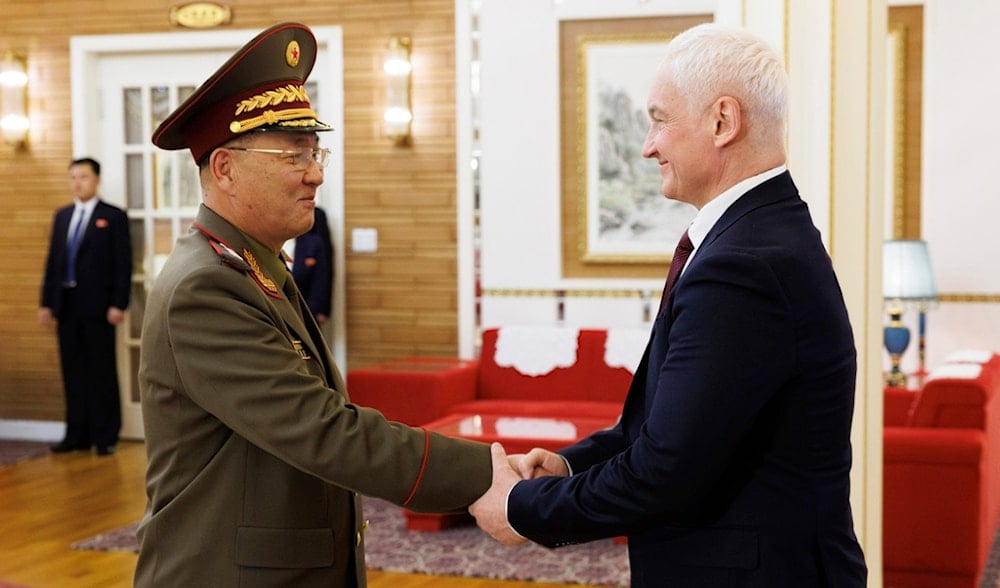DPRK pledges full support for Russia’s sovereignty and security
North Korean Defense Minister No Kwang Chol says Pyongyang will fully support Russia, citing sovereignty, territorial integrity, and historic wartime ties.
-

DPRK Defense Minister No Kwang Chol, left, and Russian Defense Minister Andrei Belousov, right, shake hands during their meeting in Pyongyang, DPRK, Nov. 29, 2024 (Vadim Savitsky, Russian Defense Ministry Press Service via AP)
DPRK Defense Minister No Kwang Chol declared on Wednesday that Pyongyang will fully support Russia, praising Moscow’s defense of sovereignty, territorial integrity, and national interests.
"Under the strategic leadership of the leaders of Korea and Russia, today, the relations between our two countries are developing in a comprehensive and purposeful cooperation for the future. We will fully support the struggle of the government, the military and the people of Russia, who, under the leadership of the country's president, Comrade Putin, reliably defend the right to sovereignty, territorial integrity and interests of the country," No Kwang Chol said, as quoted by the Russian Defense Ministry.
Belousov hailed the participation of DPRK troops in the liberation of Russia’s Kursk Region as proof of the “comprehensive strategic alliance” between Moscow and Pyongyang.
Belousov, alongside his DPRK counterpart No Gwang Chol, unveiled the sculpture “Allies. Fighters of Korea” honoring Korean partisans of World War II.
He said the monument pays tribute to past generations while underscoring the current military cooperation between the two nations.
The commemoration was seen as a symbol of historic solidarity between the two nations.
DPRK-China alliance unwavering
At the same time, leader Kim Jong Un reaffirmed Pyongyang’s unwavering commitment to deepening its strategic partnership with Beijing, describing the DPRK-China friendship as an unshakeable alliance that continues to flourish despite the shifting global order, KCNA reported on Wednesday.
In a congratulatory message to Chinese President Xi Jinping on the 76th anniversary of the founding of the People’s Republic of China, Kim lauded the enduring camaraderie between the two socialist neighbors, noting that the bond, born in the crucible of shared struggle, has only strengthened with time.
According to KCNA, Kim praised the "joint struggle for socialism" uniting the two peoples, noting that the traditional friendship forged by their forebears continues to develop as both nations advance toward self-reliant prosperity.
A new multipolar order
China, Russia, and the DPRK are tightening their strategic partnership amid rising tensions with the West. The three nations are aligning across diplomatic, military, and economic fronts, presenting themselves as a united bloc pushing back against US and allied influence.
Moscow and Pyongyang have intensified high-level exchanges, with joint commemorations of historic Soviet-Korean alliances highlighting the depth of their ties. At the same time, Beijing continues to serve as the primary economic partner for both Moscow and Pyongyang, expanding trade, energy cooperation, and infrastructure links despite sanctions pressure.
Military cooperation is also deepening, with Russia and China conducting joint exercises and enhancing security dialogues. While China’s engagement with the DPRK is more restrained, its close partnership with Moscow indirectly strengthens Pyongyang’s position.
Analysts view the alignment as part of a broader shift toward a multipolar order, with Beijing, Moscow, and Pyongyang united by common adversities and strategic interests.
More recently, Iran has become a more prominent ally, particularly by increasingly cooperating with Moscow and Beijing, sparking concerns of a growing CRINK alliance.
Read more: The emerging CRINK alliance: A new challenge to US influence

 3 Min Read
3 Min Read








